Much has changed in consumers’ buying behaviors regarding foods, but their attention to the fats and oils in the packaged foods they purchase remains consistent, according to Cargill’s most recent FATitudes survey, conducted during the COVID-19 pandemic. The research found 53% of American consumers closely monitor fats and oils in packaged foods, a rate that has remained relatively steady since 2013 when Cargill first began conducting the annual study.
“These findings are particularly relevant now given the pandemic-inspired rise in packaged food consumption,” says Jamie Mavec, marketing manager for Cargill’s global edible oils business in North America. “As consumers weigh the healthfulness of their overall diet, it’s clear that fats and oils are a key part of that equation. Options like our Filippo Berio Culinary Selection olive oil or our line of Clear Valley canola-based products, which are low in saturated fat, offer customers a way to deliver products that reflect today’s consumer preferences.”
Cargill conducts the proprietary research annually to track consumers’ awareness, perceptions, and behaviors around fats and oils found in packaged food. The 2020 study moved to a US consumer focus, unlike the 2019 global consumer focus, surveying 560 primary grocery shoppers in May 2020.
Key research findings
One notable change from past surveys is shoppers’ interest in sustainability claims. In 2020, 37% of consumers surveyed said they are more likely to purchase a packaged food product with a sustainability claim, a jump of 6% compared to 2019 results for US consumers. Those claims resonate most strongly with Gen Z and millennial shoppers, with 45% of Gen Z and 42% of millennials saying they are more likely to purchase a product with a sustainability claim. In comparison, just 32% of baby boomers said sustainability claims strongly influenced their purchase decisions.
As in past surveys, Cargill found consumers track fats and oils by closely reading labels on packaged food and what they learn helps guide their purchasing decisions. A ‘no saturated fat’ claim is the most influential, with 53% of consumers in 2020 saying they are more likely to purchase these products. That exceeds other label claims, including ‘non-genetically modified (GMO)’ and ‘organic’, prime considerations with four in ten consumers (44% and 43%, respectively).
The type of oil and fat used in packaged foods also weighs on shopping decisions. Cargill’s 2020 research revealed that the top five oils with the highest impact on packaged food purchases are olive oil (50%), avocado oil (36%), coconut oil (30%), fish oil (28%), and sunflower oil (25%). This marks a move up in sunflower oil rankings, which landed in the sixth slot in the 2019 survey.
FATitudes research facilitates strategic product development
The annual consumer research helps guide Cargill’s food innovation efforts, offering a window into consumers’ evolving priorities. At the same time, customers can use the company’s in-depth insights to steer product development efforts.
“FATitudes helps us balance consumer preferences alongside customer formulations needs, enabling us to fully leverage our broad portfolio of fats and oils, or even inform us as we create custom options for specific applications or needs,” says John Satumba, R&D director for Cargill’s global edible oils business in North America. “By fielding this type of research, we’re better positioned to help our customers innovate in ways that align with consumer desires for healthful, sustainable and cost-effective products.”
.
IndiFoodBev — authentic, impactful and influential
An English-language food and beverage processing and packaging industry B2B platform in print and web, IndiFoodBev is in its third year of publication. It is said that the Indian food and beverage industries represent approximately US$ 900 billion in revenues which implies more than 20% of the country’s GDP. Eliminating the wastage on the farmside can help to deliver more protein to a higher number of the population apart from generating sizable exports. The savings in soil, seeds, water, fertilizer, energy and ultimately food and nutrition could be the most immense contribution that country is poised to make to the moderation of climate change.
To improve your marketing and grow sales to the food and beverage processing and packaging industry, talk to us. Our research and consulting company IppStar [www.ippstar.org] can assess your potential and addressable markets in light of the competition. We can discuss marketing, communication, and sales strategies for market entry and growth.
Suppliers and service providers with a strategy and budget for targeted marketing can discuss using our hybrid print, web, video, and social media channels to create brand recognition linked to market relevance. Our technical writers are ready to meet you and your customers for content.
The second largest producer of fruit and vegetables in the world is continuously expanding processing capacities and delivery systems with appropriate innovative technologies. We cover product and consumer trends, nutrition, processing, research, equipment and packaging from farm to thali. Get our 2025 media kit and recalibrate your role in this dynamic market. Enhance your visibility and relevance to existing markets and turn potential customers into conversations. Ask for a sample copy of our bi-monthly in print or our weekly IndiFoodBev eZine each Wednesday.
For editorial info@ippgroup.in — for advertisement ads1@ippgroup.in and for subscriptions subscription@ippgroup.in
Naresh Khanna – 10 February 2025
Subscribe Now











